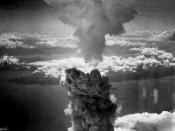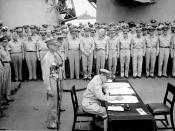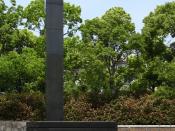To what extent were the bombs dropped on Hiroshima and Nagasaki necessary to end World War II?
In the analysis on the decision to drop 'the Bomb' on Japan at the end of World War II, historians will usually either tend to one of two schools of thought. The orthodox school stress that the atomic bombs dropped on Hiroshima and Nagasaki were necessary to end the war. The revisionist school argues that the atomic bomb was quite unnecessary. To what extent were the bombs dropped on Hiroshima and Nagasaki necessary to end WWII?
The orthodox theory relies heavily on the argument that Japan had no intention to surrender, and that the Japanese government by silently ignoring the Potsdam declaration expressed a clear refusal of the Allied terms1. The only other options open to Truman were a blockade or invasion. The bomb was conveniently promoted as a legitimate weapon of war and should be used to bring the Japanese to an quick and unconditional surrender2.
The revisionist relies on the theory that Japan was practically defeated, and tends towards accusing the US of having bureaucratic motives behind dropping the bomb, namely to deter Russia from entering the war3. Though rather then defend either school of thought in looking at the reasons behind why the bombs were finally dropped it is important to examine the state that Japan was in leading up to the dropping of the bomb. The dropping of the atomic bombs on Hiroshima and Nagasaki were not necessary to end the war, Japan had been actively looking for a way to end the war and while there was some factioning with in the powers, there are suggestions that Japan had already offered a surrender to the allies. That the Americans would except nothing less then 'Unconditional Surrender' is...



Good research
Very well done. I agree with you that it was unnecessary to bomb Hiroshima and Nagasaki to end the war. Moreover, thousands of people died for nothing.
I even think that it was done just to show to Soviet Union that the US have atomic bomb, the most powerful weapon of those times.
Great work and very well written
keep that way ;]
8 out of 8 people found this comment useful.